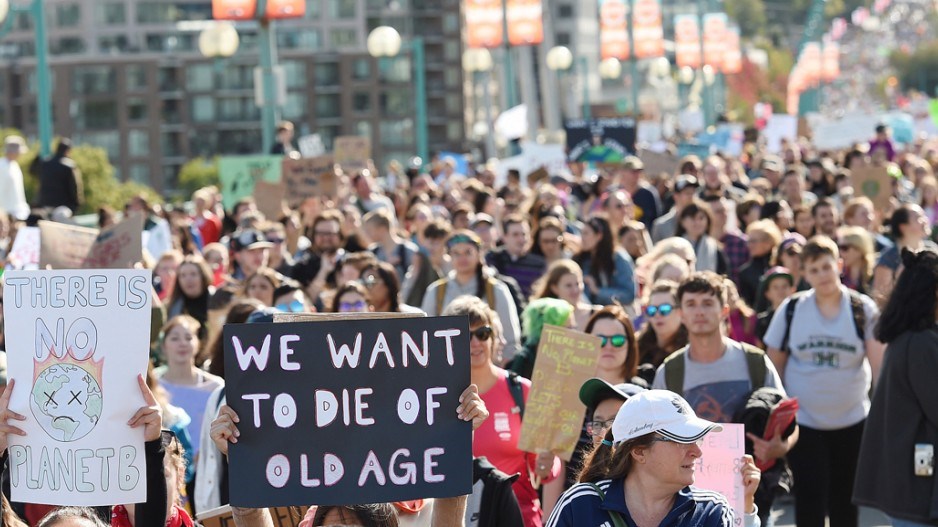Many young people engaged in civic life are used to hearing a few familiar phrases: “You are the future.” “We need to ensure that future generations enjoy what we have today.” “You give us so much hope.”
With each repetition, however, these phrases slowly turn from comfortable platitudes to irritating insincerities.
Yes, youth have always been, and will always be, “the future.” But despite this much-lauded status, we often feel like props, rather than participants, in shaping the future we are meant to inherit.
We have been following the recent debate about the economic implications of B.C.’s provincial climate action plan, CleanBC. The large and public debate, led by the Business Council of BC but amplified by a variety of other actors, concerns the alleged economic harms that will result from the climate policies and actions the province has committed to in CleanBC. Disappointingly, many critiques are being put forward without any credible alternatives.
As has been asserted many times by others, including Nancy Oliweiler in BIV, the economic implications of any climate plan are complex and a straightforward cost-benefit analysis will never capture the full range of impacts. Climate policy is not alone in struggling with this, and yet we are puzzled that many critics of a climate policy’s economic impacts do not seem equally concerned with the dubious economic prospects of LNG or appear unwilling to call attention to the $5.3 billion in subsidies that a consortium of immensely profitable companies seek to get the LNG Canada project off the ground.
Beyond this purely economic argument, too, is the non-financial value of climate action. We do not believe that you can put a price on the loss of sockeye salmon, a keystone species with deep cultural importance to the Coast Salish peoples. There is similarly no number we can assign to the value of having cleaner air and less frequent and less severe extreme weather events, and no figure to adequately express the crippling grief and anxiety that we and others experience every day as we watch our world burn and our futures crumble.
The framing of the economic debate about climate policy in B.C., which has been significantly couched in language about our (and younger and future generations) interests, but without youth’s direct input, ignores the demands we have marched for in the streets for years: To take immediate and far-reaching actions to halt climate change and build a better and more just economy while we do so.
Young people are on the front lines of the provincial affordability and climate crises; we do not see these issues as separate. Young people care about the future of sustainable jobs in a clean economy. CleanBC is part of, but not the whole, of realizing the economic future we want and deserve.
We ask you to refrain from using young people’s futures as an excuse to make risky investments in fossil fuels in B.C. during what must be an economy-wide transition to renewable energy. We know that a brilliantly executed wildfire management strategy will never reverse the damage of expanding high-emitting industries. To suggest that improved wildfire management will significantly reduce B.C.’s emissions while increasing gas exports as a ‘climate solution’ is a red herring and merely transfers the onus of reducing the exported emissions to another country.
Fundamentally, however, we are left with the question: Why are we comparing a world with CleanBC, an imperfect but important part of B.C.’s climate action work, to one without it? As citizens of the present, but also the future, we are compelled to challenge this incomprehensible juxtaposition: A discussion of the costs or drawbacks of one climate plan without proposing alternatives or another plan is morally and practically irresponsible.
To do so is to act against the future these critics claim to be trying to protect. We empathize with and echo the emotions of Greta Thunberg in her 2019 speech at the United Nations Climate Action Summit where she decried the “empty words” of leaders who talk about climate change, yet fail to offer real solutions. As she said then, and we say now: Our eyes are on you, do not fail us.
With each passing year, the dread of B.C.’s young people increases as different elected and business leaders of all political persuasions delay and deflect on the hard but necessary decisions required to safeguard our future, all the while saying that they are working to “protect future generations.”
We choose to take these words at face value. We do not believe anyone actively wakes up intending to leave future generations worse off, but we do believe there is an inherent generational chauvinism that we must all be watchful for. Young people in B.C. know the science, the economics and the morality of climate change. We expect our leaders to know and consider the same and to propose real solutions, rather than engaging in a new era of climate denial that masquerades concerns about impacts to avoid taking meaningful action.
Climate change is not a partisan or a purely economic issue, nor is it a matter of us versus them: It is a wicked problem that will only be solved when all of society works together. We encourage all leaders to work with us and to work for us – but please, do not speak for us.
George Benson and Eden Luymes are members of the B.C. Climate Solutions Council. Rita Steele is the founder of the BIPOC Sustainability Collective, and Christie McLeod is a board member of Lawyers for Climate Justice.




